The Sopranos
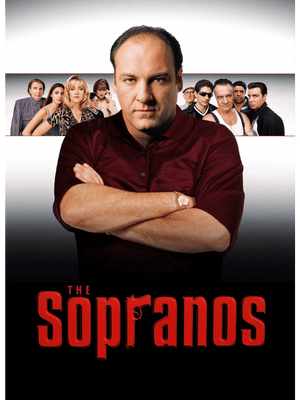
(1999-2007), TV-MA, 1h
Table of Contents
What Is The Sopranos About?
A mob boss struggles to manage his crime family and personal life.
Why You Should Watch The Sopranos
The Sopranos is widely regarded as one of the greatest television series of all time, and there are many compelling reasons why someone should watch it. Its groundbreaking storytelling, complex characters, and cultural impact make it a must-see for any television enthusiast.
The Sopranos revolutionized television storytelling by blending elements of crime drama with deep psychological exploration. The series follows Tony Soprano, a mob boss who seeks therapy to deal with personal and professional issues. This unique premise allows for a rich narrative that delves into both the violent world of organized crime and the inner workings of its characters’ minds. The show’s creators masterfully weave intricate plotlines with slow-burn character development, creating a captivating and immersive viewing experience.
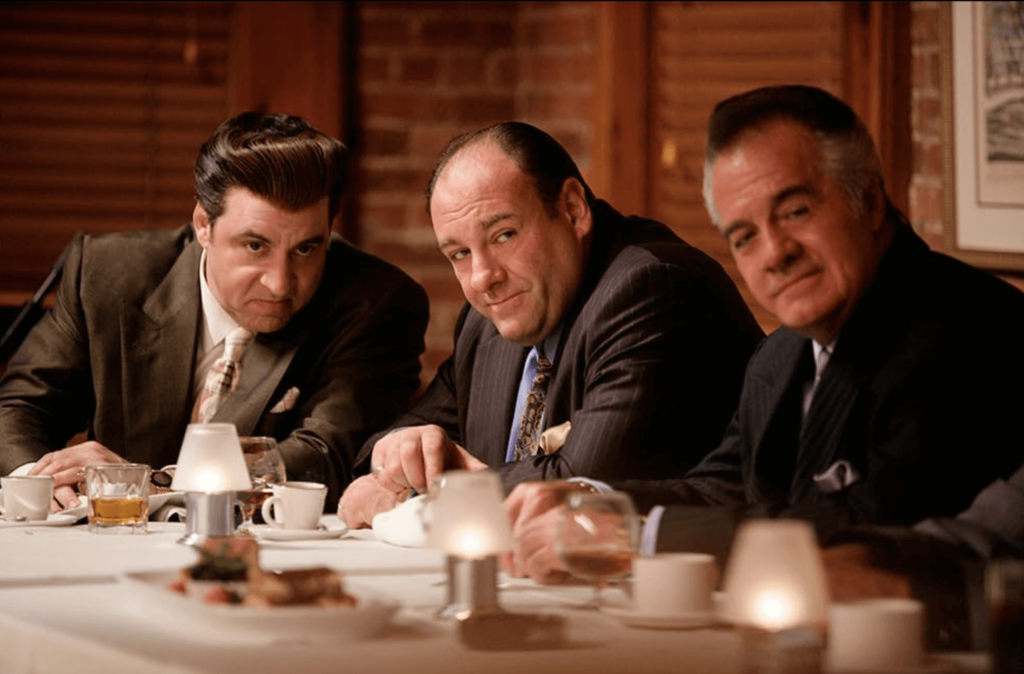
One of the show’s greatest strengths is its complex and multi-dimensional characters. Tony Soprano, portrayed by the late James Gandolfini, is a deeply flawed yet compelling protagonist. His struggles with anxiety, depression, and the moral dilemmas of his dual life as a family man and mob boss make him one of the most fascinating characters in television history. The supporting cast, including Edie Falco as Carmela Soprano, Michael Imperioli as Christopher Moltisanti, and Lorraine Bracco as Dr. Jennifer Melfi, deliver equally powerful performances. Each character is meticulously crafted with their own distinct arcs, motivations, and conflicts, adding layers of depth to the story.
The show provides a gritty, realistic portrayal of mob life, stripping away the romanticism often associated with organized crime in popular culture. It presents the mundane aspects of running a criminal enterprise alongside the violent and morally ambiguous decisions that define the mob’s existence. This unflinching depiction adds authenticity and gravity to the narrative, making the stakes feel real and the consequences significant.
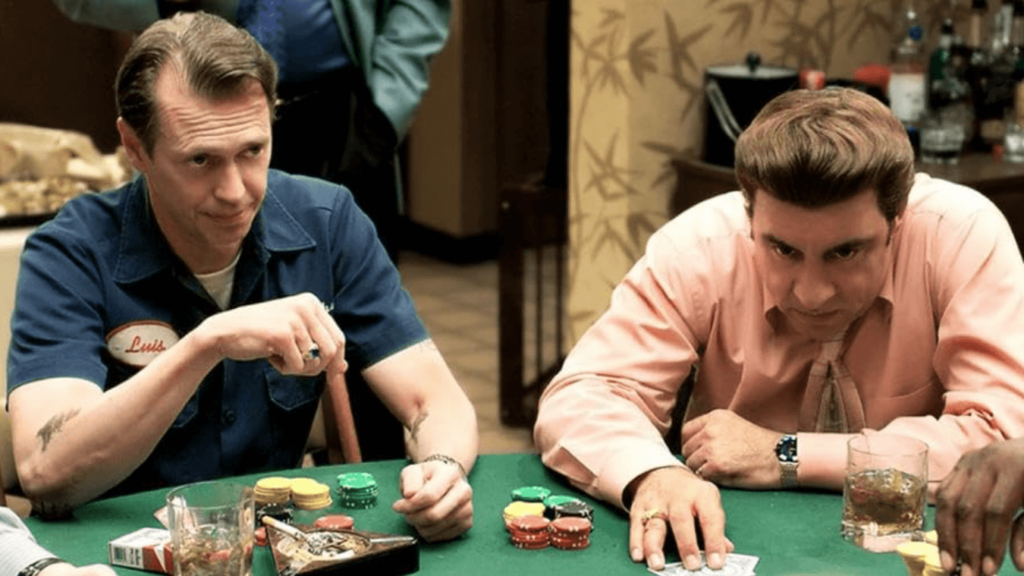
The Sopranos is notable for its nuanced exploration of mental health, particularly through Tony’s therapy sessions with Dr. Melfi. These sessions offer a rare glimpse into the psyche of a mob boss, addressing issues like depression, anxiety, and panic attacks. The show highlights the stigma surrounding mental health, especially in a hyper-masculine environment, and portrays therapy as a legitimate and necessary means of coping with psychological issues.
The series provides a detailed and often poignant look at family dynamics, particularly within the Soprano household. It examines the impact of Tony’s double life on his wife, Carmela, and their children, Meadow and A.J. The show’s portrayal of the Soprano family is multifaceted, capturing the love, tension, and conflicts that arise from living in the shadow of organized crime. These domestic scenes ground the series in a relatable reality, making the characters’ struggles and triumphs more resonant.
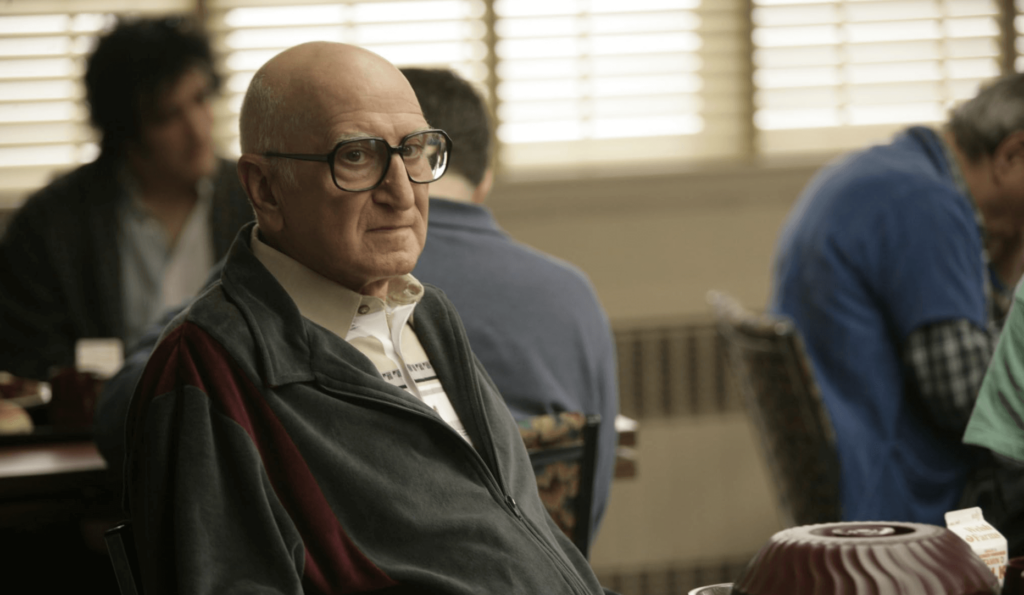
Since its debut in 1999, The Sopranos has had a lasting impact on popular culture and the television industry. It is credited with ushering in the era of prestige television, paving the way for other critically acclaimed series like “The Wire,” “Breaking Bad,” and “Mad Men.” The show’s influence extends to its portrayal of antiheroes and complex storytelling, setting a new standard for quality television. Its cultural references, memorable quotes, and iconic moments have permeated popular culture, making it a touchstone for fans and critics alike.
The production values of The Sopranos are exceptional, with top-notch writing, directing, and acting. The attention to detail in the set design and costumes adds to the authenticity and immersion of the series.
The Sopranos is a landmark television series that offers groundbreaking storytelling, complex characters, and cultural significance. Its exploration of the human psyche, coupled with its portrayal of the criminal underworld, creates a compelling and thought-provoking narrative. Whether you are a fan of crime dramas, character-driven stories, or simply great television, The Sopranos is a must-watch that continues to resonate with audiences and influence the medium.
The Theme of The Sopranos
The Sopranos is a rich tapestry of themes that delve into the complexities of human nature, morality, identity, and the American Dream. These themes are interwoven throughout the series, providing depth and resonance to the characters’ actions and the narrative as a whole.
Family and loyalty are central themes in The Sopranos, explored through both Tony Soprano’s biological family and his crime family. The show examines the tension between familial obligations and personal desires. Tony’s relationship with his wife, Carmela, and his children, Meadow and A.J., highlights the challenges of balancing family responsibilities with the demands of his criminal life. Loyalty within the mob is also scrutinized, as betrayals and shifting alliances create ongoing conflict and drama.
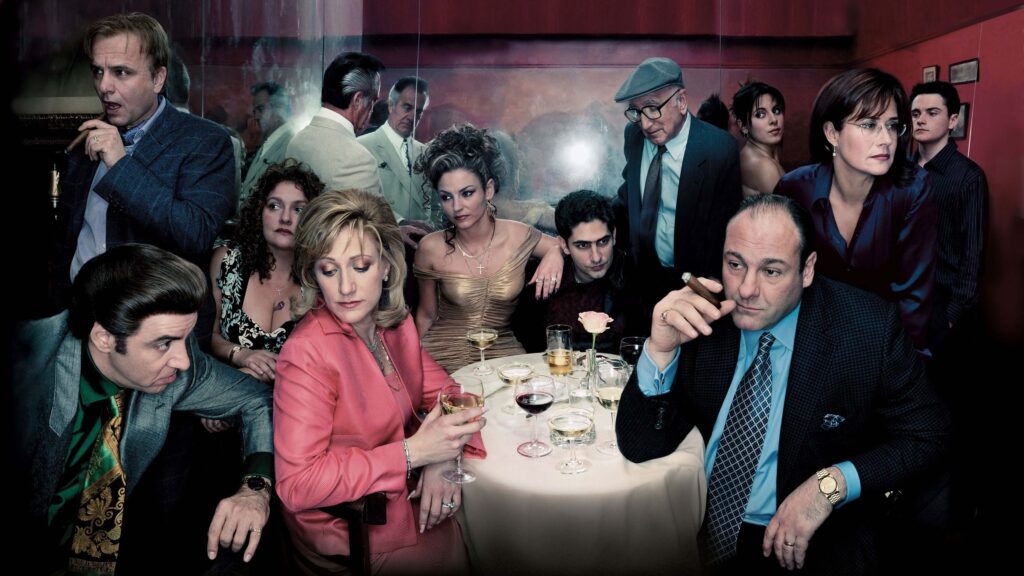
The theme of identity and duality is pivotal to the series, particularly through the character of Tony Soprano. Tony’s dual roles as a ruthless mob boss and a suburban family man create a constant internal conflict. His sessions with Dr. Melfi serve as a lens through which his struggles with self-identity and his attempts to reconcile these two aspects of his life are explored. This duality is mirrored in other characters who grapple with their own contrasting identities and moral ambiguities.
The Sopranos consistently explores themes of morality and ethics, often blurring the lines between right and wrong. Characters are frequently placed in situations that challenge their moral compasses. Tony, for instance, is a character who commits heinous acts but also shows moments of vulnerability and compassion. The series does not offer clear moral judgments, instead presenting a nuanced portrayal of the characters’ ethical dilemmas and the consequences of their actions.
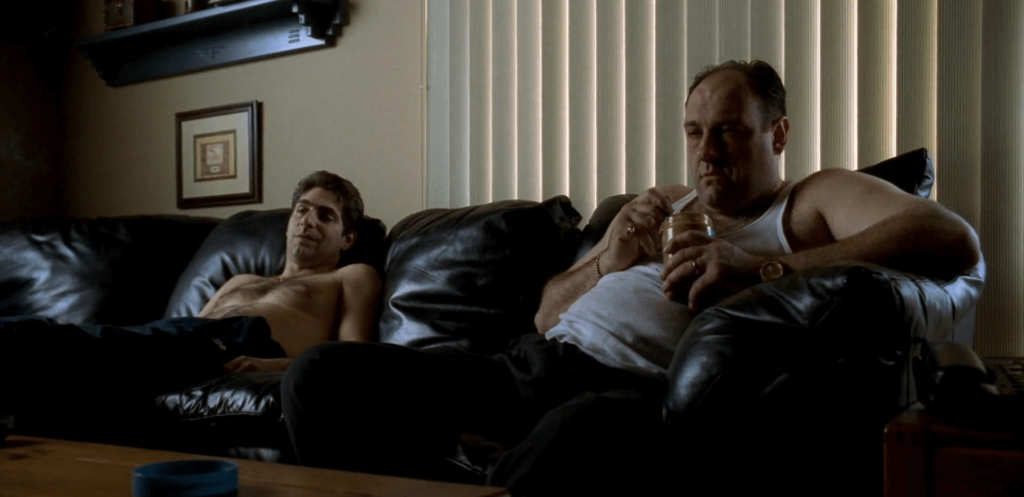
Mental health and therapy are significant themes in The Sopranos, primarily through Tony’s ongoing sessions with Dr. Melfi. These sessions provide insight into Tony’s psyche, addressing issues such as anxiety, depression, and panic attacks. The series highlights the stigma surrounding mental health, particularly in the macho world of the mob. Dr. Melfi’s professional and personal struggles in treating Tony also underscore the complexities and ethical challenges of psychotherapy.
The pursuit of the American Dream is a recurring theme, often depicted in a paradoxical light. While the characters seek prosperity, success, and happiness, their methods and the consequences of their actions often lead to disillusionment and tragedy. Tony’s lavish lifestyle and material wealth contrast sharply with the emotional and psychological costs of his choices, reflecting the hollowness and moral compromise sometimes inherent in the American Dream.
Power and control are central to the dynamics of The Sopranos, both within the mob hierarchy and in the characters’ personal lives. Tony’s leadership is constantly challenged, and his need to assert dominance leads to violent confrontations and strategic maneuvers. The series also examines control in personal relationships, such as Carmela’s struggle for autonomy and the power dynamics within Tony’s family.
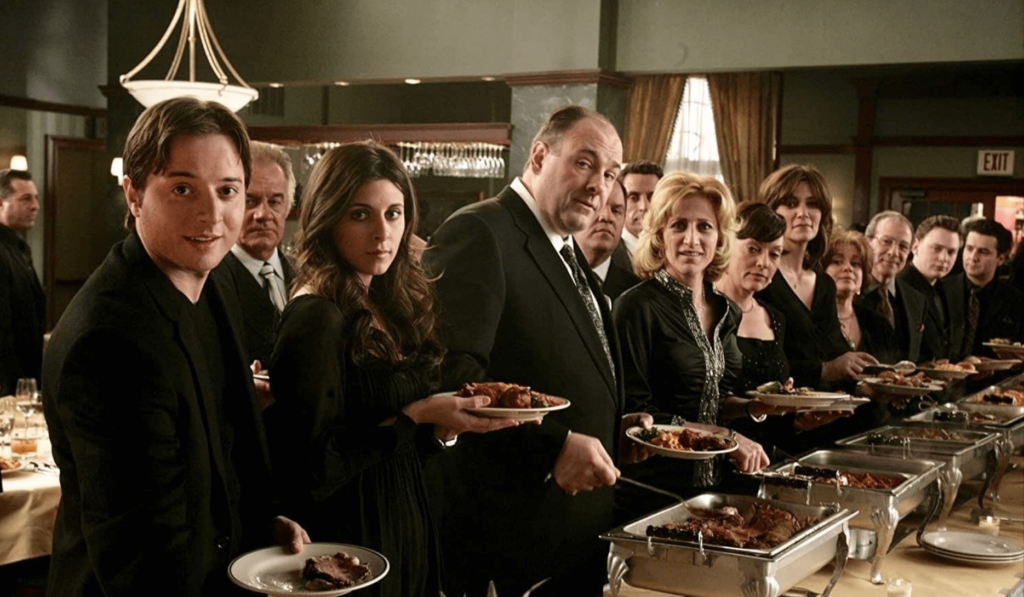
Mortality and legacy are pervasive themes, with characters frequently confronting their own mortality and the impact of their actions. The inevitability of death and the desire to leave a meaningful legacy weigh heavily on Tony and others. This theme is poignantly addressed through storylines involving illness, aging, and the violent deaths of key characters, underscoring the transient nature of life and the enduring consequences of one’s choices.
The Cinematography of The Sopranos
The cinematography of The Sopranos is integral to its storytelling, contributing significantly to the show’s mood, themes, and character development. Alik Sakharov, Phil Abraham, and other talented cinematographers worked on the series, creating a visual language that is both cinematic and intimate.
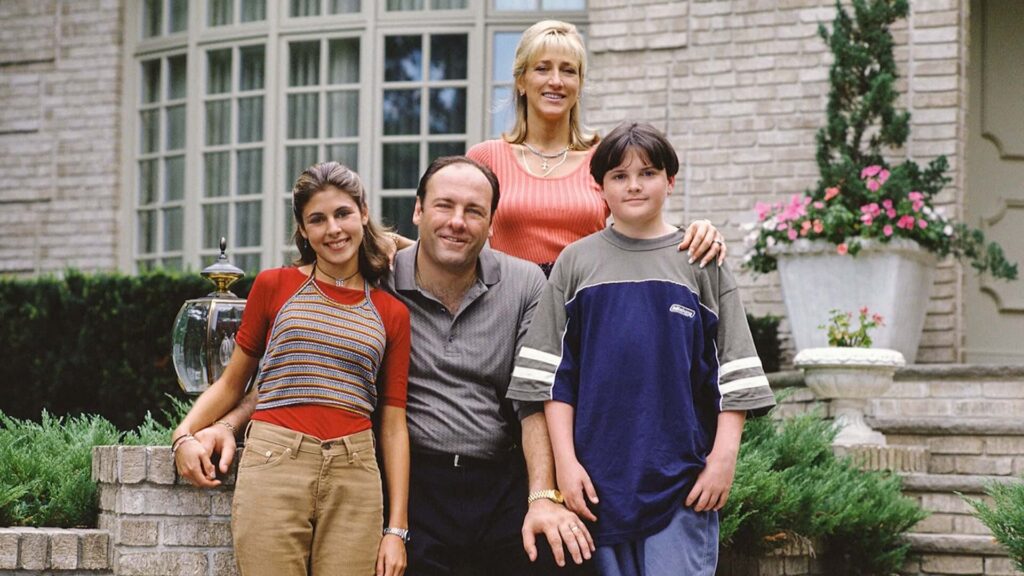
The visual style of The Sopranos is characterized by its use of naturalistic lighting and meticulous composition. The cinematographers often employed a subdued color palette, reflecting the gritty, sometimes bleak reality of the characters’ lives. The show’s setting in suburban New Jersey is depicted with a sense of realism, making the environment a character in its own right.
Lighting in The Sopranos plays a crucial role in setting the tone. The series often uses low-key lighting to create shadows and a sense of foreboding. This technique is especially prevalent in scenes involving Tony Soprano and his dealings with the mob, highlighting the darkness and danger inherent in his world. In contrast, family scenes in the Soprano home are often lit more warmly, providing a stark juxtaposition between Tony’s two worlds.
The camera work in The Sopranos is varied, employing a mix of static shots, handheld cameras, and smooth tracking shots to convey different emotions and perspectives. Static shots are frequently used to create a sense of unease or to emphasize the isolation of a character. For example, many of Tony’s therapy sessions with Dr. Melfi are shot with static, symmetrical framing, underscoring the clinical nature of their interactions and Tony’s psychological state.
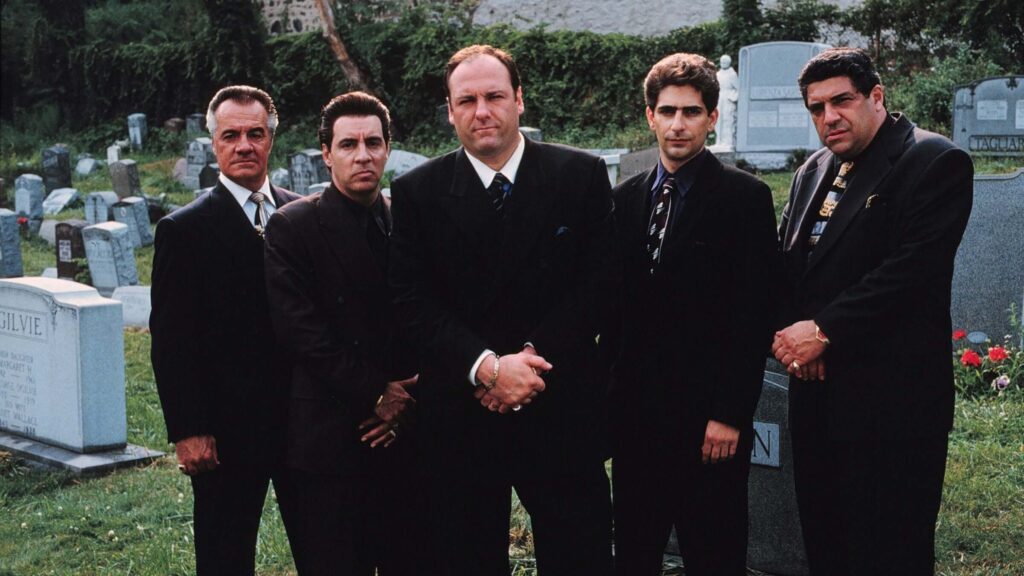
Handheld cameras are used to inject a sense of immediacy and chaos, particularly in scenes of violence or high tension. This technique helps the audience feel the unpredictability and volatility of the mob world. Conversely, smooth tracking shots are often used to follow characters through their environments, providing a sense of continuity and fluidity, as seen in many of the show’s more introspective moments.
The Soundtrack of The Sopranos
The soundtrack of The Sopranos is a vital element that enhances the narrative, mood, and character development throughout the series. Curated by creator David Chase, the music selection spans various genres and eras, reflecting the complex emotional landscape of the characters and the cultural milieu of the show.
The opening theme, “Woke Up This Morning” by Alabama 3, sets the tone for the series with its gritty and bluesy sound. The lyrics and rhythm encapsulate the tension and existential angst that pervade Tony Soprano’s life. The opening credits sequence, featuring Tony driving through New Jersey, becomes iconic, instantly recognizable, and a harbinger of the show’s themes of violence and introspection.

One of the defining features of The Sopranos soundtrack is its eclecticism. The series incorporates a wide range of musical styles, including rock, jazz, classical, pop, and even opera. This diversity reflects the multifaceted nature of the characters and their experiences. For instance, the use of classic rock tracks like “Don’t Stop Believin’” by Journey in the series finale underscores moments of ambiguity and unresolved tension.
Music is often used to underscore specific characters and their arcs. For example, Tony Soprano’s affinity for classic rock and jazz mirrors his nostalgia for a bygone era and his longing for stability amidst his chaotic life. Tracks like “Living on a Thin Line” by The Kinks or “Glad Tidings” by Van Morrison are emblematic of Tony’s internal conflicts and existential dilemmas.
The soundtrack plays a crucial role in heightening the emotional impact of key scenes. Songs are meticulously chosen to align with the narrative beats, often providing deeper insight into the characters’ psyches. For instance, the use of “Con Te Partirò” by Andrea Bocelli during significant moments adds a layer of operatic drama and poignancy, enhancing the emotional resonance of the scenes.
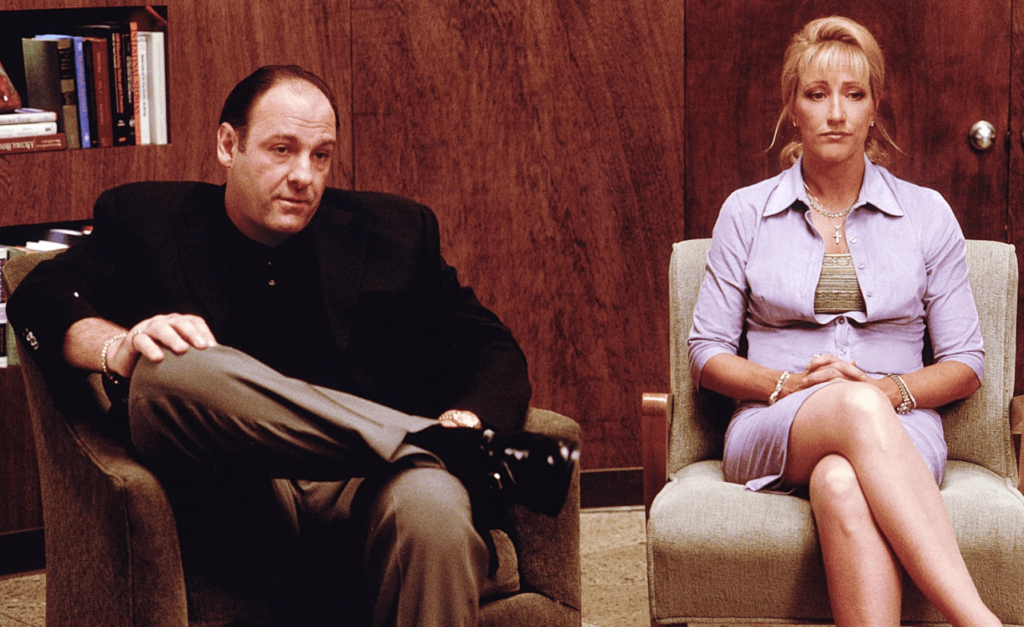
The music in The Sopranos also serves to situate the show within a broader cultural and historical context. By including tracks from different eras, the series creates a rich tapestry that reflects the changing times and the enduring nature of the mob world. The juxtaposition of old and new songs highlights the characters’ struggles to reconcile their traditional values with contemporary realities.
Several musical moments in The Sopranos have become iconic. The use of “Don’t Stop Believin’” in the final scene of the series is one of the most memorable, leaving viewers with a sense of ambiguity and open-endedness. Another notable example is the use of “Thru and Thru” by The Rolling Stones during a climactic scene in the fifth season, which underscores the themes of loyalty and betrayal.
The Cast of The Sopranos
- James Gandolfini as Tony Soprano – The central character of the series, Tony is a mob boss trying to balance the demands of his crime family with those of his personal life.
- Edie Falco as Carmela Soprano – Tony’s wife, Carmela, struggles with her loyalty to her husband and her moral conflicts about his criminal lifestyle.
- Lorraine Bracco as Dr. Jennifer Melfi -: Tony’s psychiatrist, who treats him throughout the series.
- Michael Imperioli as Christopher Moltisanti – Tony’s protégé and nephew, Christopher is ambitious and seeks to rise within the ranks of the mob.
- Dominic Chianese as Junior Soprano – Tony’s uncle and a former boss of the family, Junior often clashes with Tony for control.
- Steven Van Zandt as Silvio Dante – Tony’s consigliere and one of his closest friends, Silvio is known for his level-headedness and loyalty.
- Tony Sirico as Paulie “Walnuts” Gualtieri – A senior member of Tony’s crew, Paulie is fiercely loyal but has a volatile personality.
- Jamie-Lynn Sigler as Meadow Soprano – Tony and Carmela’s daughter, Meadow is intelligent and independent.
- Robert Iler as Anthony “A.J.” Soprano Jr. – Tony and Carmela’s son, A.J. struggles with growing up in the shadow of his father’s reputation and expectations.
- Aida Turturro as Janice Soprano – Tony’s older sister, Janice is manipulative and often causes trouble for the family.
- Drea de Matteo as Adriana La Cerva – Christopher’s girlfriend and later fiancé.
- Steve Schirripav as Bobby “Bacala” Baccalieri – A high-ranking member of Tony’s crew and Junior’s caretaker.
- Joe Pantoliano as Ralph Cifaretto – A violent and unpredictable member of Tony’s crew.
- John Ventimiglia as Artie Bucco – Tony’s childhood friend and owner of the Vesuvio restaurant.
- Vincent Curatola as Johnny Sack – A high-ranking member of the New York crime family and eventually its boss.
The Filmmakers of The Sopranos
- David Chase: Creator, showrunner, head writer, and executive producer
- Brad Grey: Executive producer
- Robin Green: Writer and executive producer
- Mitchell Burgess: Writer and executive producer
- Terence Winter: Writer and executive producer
- Matthew Weiner: Writer and producer
- Ilene S. Landress: Executive producer
- Henry J. Bronchtein: Producer and director
- Tim Van Patten: Director and producer
- Alan Taylor: Director
- John Patterson: Director
- Allen Coulter: Director
- Daniel Attias: Director
- Steve Buscemi: Director and actor
- Peter Bogdanovich: Director
- Frank Renzulli: Writer and co-executive producer
- Lawrence Konner: Writer
- Diane Frolov and Andrew Schneider: Writing partners

Capicola Pizza

Inspiration
Tony’s Gabagool
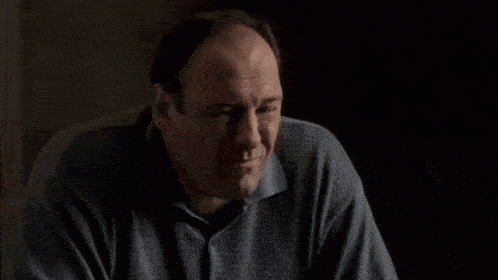
More About The Sopranos
The Sopranos primarily takes place in New Jersey, specifically in the suburban areas surrounding Newark. Key locations within the series include:
North Caldwell
- Tony Soprano’s home is located in the affluent suburb of North Caldwell, New Jersey.
Newark
- Newark is often referenced as part of the characters’ pasts and present lives, reflecting the area’s historical significance in the mob world.
Satriale’s Pork Store
- This is a frequent meeting place for Tony and his crew, located in Kearny, New Jersey.
Bada Bing!
- The strip club owned by Tony Soprano, which serves as a front for many of his illicit activities, is located in Lodi, New Jersey.
Vesuvio
- A popular restaurant where Tony and his associates often dine, adding to the series’ authentic New Jersey atmosphere.
Dr. Melfi’s Office
- Tony’s therapy sessions take place in an office that is depicted as being in the suburbs of New Jersey.
Various Locations
- The series also features scenes in New York City, particularly in Manhattan and Brooklyn, reflecting the interactions between the New Jersey mob and the larger New York crime families.
These locations contribute to the show’s realistic portrayal of the suburban and urban environments of New Jersey and New York, grounding the narrative in a specific and vividly depicted setting.
Characters in The Sopranos often drop their guns for several reasons tied to the practicalities and psychological aspects of committing crimes within the narrative:
Practical Reasons
- Avoiding Evidence: Dropping a gun after a crime is a way to avoid being caught with the weapon, which could serve as evidence linking them to the crime. Guns can be traced back to their owners through serial numbers, fingerprints, and ballistic evidence, so leaving the gun at the scene helps reduce the risk of being tied to the act.
- Escape and Mobility: After committing a crime, characters need to escape quickly. Carrying a weapon can be cumbersome and risky, especially if they are stopped by law enforcement. Dropping the gun allows for a quicker and less encumbered getaway.
Psychological Reasons
- Disassociation from the Act: Dropping the gun can also symbolize a psychological need to distance oneself from the violent act they’ve just committed. It’s a way to rid themselves of the immediate instrument of violence and the guilt associated with it.
- Immediate Abandonment: In the heat of the moment, characters might drop the gun instinctively, driven by adrenaline and the urgent need to flee the scene. This act can be an automatic response to the stress and danger of the situation.
Narrative and Character Development
- Realism and Grit: “The Sopranos” aims for a certain level of realism and grittiness in its depiction of mob life. Dropping guns after crimes is a trope rooted in real-world criminal behavior, adding to the authenticity of the show.
- Character Insights: These actions provide insights into the characters’ states of mind, their level of professionalism, and their approach to handling high-stress situations. It shows a mix of calculated decision-making and impulsive reactions, reflecting the complexity of the characters’ lives in the mob world.
By including such details, “The Sopranos” effectively portrays the practicalities and psychological impacts of crime, contributing to the show’s depth and realism.
Tony Soprano can be considered an audience surrogate to some extent, though not in the traditional sense. An audience surrogate is typically a character who represents the audience’s perspective, asking questions and experiencing new situations alongside the audience. Tony Soprano differs in that he is the central character through whose eyes we experience much of the series, but he is far from an ordinary or relatable character in many respects.
Tony Soprano as a Complex Audience Surrogate
- Central Perspective
- The series revolves around Tony’s life, thoughts, and experiences. We see the world largely from his point of view, providing insight into the workings of the mob, his family life, and his psychological struggles.
- Inner Conflict and Humanity
- Tony’s sessions with Dr. Melfi serve as a window into his psyche, making his internal conflicts and vulnerabilities accessible to the audience. These therapy sessions often explore themes of morality, identity, and existential angst, which can resonate with the audience on a human level, despite Tony’s criminal lifestyle.
- Moral Ambiguity
- Tony embodies the moral ambiguity that the audience grapples with. His character forces viewers to confront their own moral judgments and the complexities of human behavior. This ambiguity makes Tony a mirror for the audience’s own conflicting feelings about right and wrong.
- Relatability Through Flaws
- While Tony is a mob boss, his personal struggles, such as dealing with family issues, work stress, and mental health, are universal themes that many viewers can relate to. These aspects of his character make him a surrogate for the audience’s own experiences with life’s challenges.
Differences from Traditional Surrogates
- Criminal Lifestyle
- Unlike typical audience surrogates, Tony’s life involves violence, crime, and moral transgressions that most viewers do not relate to. This creates a distance between him and the audience in terms of direct identification.
- Complex Character:
- Tony is a deeply flawed and multifaceted character, often making decisions that are difficult to empathize with. His actions and choices can be repellent, yet the audience is drawn to his charisma and complexity.
Conclusion
Tony Soprano serves as a complex and unconventional audience surrogate. While he doesn’t represent the audience’s perspective in a straightforward way, his character’s depth, internal struggles, and the way his story is told allow viewers to engage with the series on a profound level. Through Tony, the audience explores themes of morality, identity, and human nature, making him a unique and powerful conduit for the show’s narrative.

